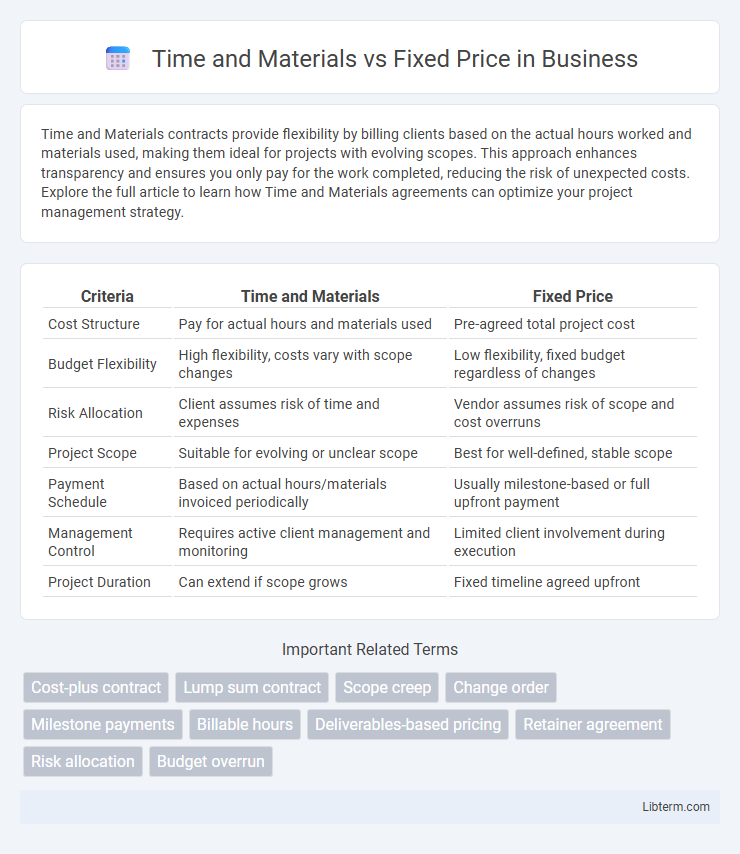Time and Materials contracts provide flexibility by billing clients based on the actual hours worked and materials used, making them ideal for projects with evolving scopes. This approach enhances transparency and ensures you only pay for the work completed, reducing the risk of unexpected costs. Explore the full article to learn how Time and Materials agreements can optimize your project management strategy.
Table of Comparison
| Criteria | Time and Materials | Fixed Price |
|---|---|---|
| Cost Structure | Pay for actual hours and materials used | Pre-agreed total project cost |
| Budget Flexibility | High flexibility, costs vary with scope changes | Low flexibility, fixed budget regardless of changes |
| Risk Allocation | Client assumes risk of time and expenses | Vendor assumes risk of scope and cost overruns |
| Project Scope | Suitable for evolving or unclear scope | Best for well-defined, stable scope |
| Payment Schedule | Based on actual hours/materials invoiced periodically | Usually milestone-based or full upfront payment |
| Management Control | Requires active client management and monitoring | Limited client involvement during execution |
| Project Duration | Can extend if scope grows | Fixed timeline agreed upfront |
Understanding Time and Materials Contracts
Time and Materials contracts provide flexibility by billing clients based on actual labor hours and material costs, making them ideal for projects with evolving scopes or unclear requirements. These contracts require detailed tracking of employee time and resource usage to ensure transparency and accuracy in invoicing. Understanding Time and Materials agreements helps clients manage budget risks while accommodating changes during project development.
What Is a Fixed Price Contract?
A fixed price contract establishes a set budget for a project, where the contractor agrees to deliver specified deliverables for an agreed-upon price, regardless of the actual time or resources spent. This contract type minimizes financial risk for the client by providing cost certainty and clear project scope, making it ideal for projects with well-defined requirements. Fixed price contracts often include detailed milestones and penalties for delays, ensuring accountability and a predictable timeline.
Key Differences Between Time and Materials and Fixed Price
Time and Materials contracts charge clients based on actual hours worked and materials used, offering flexibility for projects with evolving requirements. Fixed Price contracts set a predetermined budget regardless of time or resources involved, providing cost predictability but less adaptability to scope changes. Key differences include risk allocation, billing methods, and project scope clarity, with Time and Materials suited for uncertain projects and Fixed Price for well-defined deliverables.
Pros and Cons of Time and Materials Contracts
Time and Materials (T&M) contracts offer flexibility by allowing clients to pay for actual hours worked and resources used, accommodating scope changes without renegotiation. This model ensures transparency and precise tracking but may lead to budget overruns due to less cost predictability compared to Fixed Price contracts. Teams and clients using T&M benefit from agility in development while needing stringent monitoring to control expenses effectively.
Advantages and Disadvantages of Fixed Price Agreements
Fixed Price Agreements offer clear budget predictability and defined project scope, making them ideal for well-established requirements and minimizing financial risks. However, these agreements lack flexibility for changes or unexpected challenges, often leading to scope creep disputes or compromised quality if project specifications evolve. They may also result in higher initial estimates to cover potential risks, limiting adaptability in dynamic project environments.
When to Choose Time and Materials
Time and Materials contracts are ideal for projects with evolving requirements or uncertain scope, allowing flexibility in development and adjustments during the process. They enable better collaboration between clients and teams, as payments are based on actual hours worked and materials used, promoting transparency and adaptability. This model suits innovative projects, startups, or complex tasks where precise estimations are difficult and ongoing changes are expected.
Ideal Scenarios for Fixed Price Contracts
Fixed price contracts are ideal for projects with well-defined scopes, clear requirements, and minimal expected changes, ensuring budget predictability and fixed timelines. They suit scenarios like software development with established specifications, construction projects with detailed plans, and procurement of standardized products or services. These contracts minimize risk for buyers by locking in costs upfront and incentivize efficient project execution by contractors.
Cost Control Strategies for Both Models
Time and Materials contracts allow greater flexibility with costs tied to actual labor and materials used, requiring vigilant tracking and regular reporting to control expenses. Fixed Price agreements demand thorough upfront project scope definition and risk allocation to prevent cost overruns, emphasizing contract clarity and milestone-based payments for effective budget management. Implementing robust project management tools and transparent communication enhances cost control in both models by ensuring real-time visibility and accountability.
Impact on Project Scope and Flexibility
Time and Materials contracts offer greater flexibility by allowing project scope to evolve based on ongoing requirements and client feedback, accommodating changes without renegotiating terms. Fixed Price contracts enforce a rigid project scope defined upfront, limiting adaptability and often resulting in scope creep penalties or change order negotiations if adjustments are needed. This distinction significantly impacts project management, with Time and Materials better suited for dynamic, uncertain environments and Fixed Price favoring well-defined, stable project requirements.
How to Decide: Choosing the Right Contract Type
Choosing the right contract type depends on project scope clarity and risk tolerance; fixed price contracts suit well-defined projects with stable requirements, ensuring budget predictability. Time and materials contracts offer flexibility for projects with evolving specifications, allowing client involvement and adjustments during development. Evaluating factors such as project complexity, client control preference, and risk distribution helps determine the optimal contract type for successful project completion.
Time and Materials Infographic

 libterm.com
libterm.com